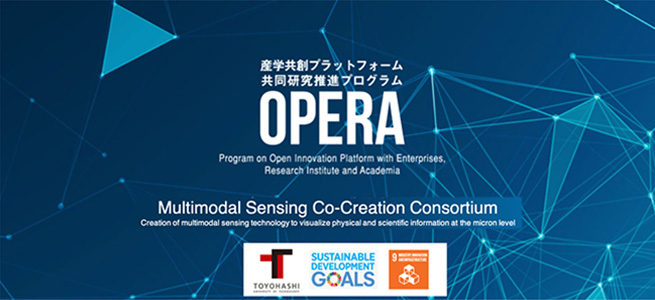
ここからコンテンツです。

Changing the world and contributing to society through technological science
Aiming to be a vibrant universityKazuhiko Terashima

Introducing President Kazuhiko Terashima, who became Toyohashi University of Technology’s new president in April 2020 in the midst of the global crisis brought on by the COVID-19 pandemic. Immediately upon taking up his post, he began work on COVID-19 countermeasures, while keeping the preservation of student education and research as his first priorities. Choosing to see ‘tough times as an opportunity’, President Terashima speaks about the new role of the university in a world shaped by COVID-19. It is his belief that, by furthering mastery of our fields of expertise in sensing, AI, IoT and robotics, TUT can contribute to the resolution of social problems faced by the local community and the world beyond.
Interview and report by Madoka Tainaka
To keep education and research going
In the spring of 2020, many Japanese universities switched from the traditional in-person classes to online or on-demand education, in response to the COVID-19 pandemic. TUT did the same, cancelling its Entrance Ceremony, and beginning preparations for remote on-demand classes in April that were launched in May. While this was happening, President Terashima was striving to guarantee continued high standards in the quality of education and research.
"We worked like crazy and little-by-little we are seeing the results. The teachers needed to hastily prepare video recordings for the on-demand lectures amongst other things, and I think they went through a lot of difficulties, but the on-demand learning is effective for preparation and revision, and I even feel that there are elements that make it a more suitable method for the acquisition of knowledge. Also, around 300 out of our 2,000 students are international students and many new international students and students on temporary leave from Japan were unable to travel to Japan, so the online classes allowed them to take their classes remotely from their home countries.
On the other hand, there were many things that gave me a solid sense of the advantages of in-person classes. There are some things that are only born through teachers and students having face-to-face discussions and communicating with each other. The epitome of this is research. As remote learning continues, some argue that there is no more need for universities, but universities play an important role by providing a space and an opportunity for research. So thorough COVID-19 measures are indispensable," President Terashima stresses.
However, President Terashima confesses that he went through a lot of pains implementing COVID-19 measures because of TUT’s unique circumstances. One third of the student population lives in the on-campus dormitories, and there are many students who come in and out of the laboratories for experiments or research. If we were not careful, we could have had a cluster of COVID-19 cases. Furthermore, about 180 students primarily in the Global Technology Architects Course live in a share-house type of dormitory, and both Japanese and international students live together with 5 people per room.
"I was torn, but I strongly believed that we must keep our education and research going, so we dealt with the issue by thoroughly enforcing a new way of life, hand-washing, disinfecting and avoiding the 3Cs. Thanks to these measures, we have made it to the present without creating any clusters."
Focusing on improving the learning environment through sending messages and financial support
On the other hand, President Terashima came up with his own ideas for unique measures as he wanted to support the students who were feeling anxious about the COVID-19 crisis. One of those ideas is the TUT Ale Lunch.
"Every Friday in May, we offered residents of the student dormitories a balanced lunch worth 500 JPY for free. I believe it helped a little with the students’ mental and physical health.
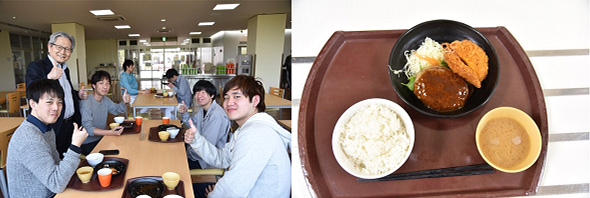
I myself sent messages to the students on the TUT website for 5 weeks from April to May in a series entitled "Ale for students - A Message from President Terashima". I delivered these messages, about globalization, SGDs, 50 Tips for Adults (Tera-go-roku) - the principles that I live by on a daily basis, my field of expertise - robotic engineering, via text and video. In the final installment, ‘The History of Infectious Diseases – Fortune is Unpredictable and Changeable’, I retraced the history of infectious diseases, and encouraged the students to ‘turn hardship into opportunity’."
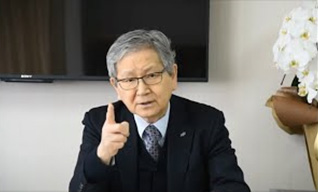
In this series, President Terashima highlighted the example of Isaac Newton, who, over 300 years ago, was forced to returned to his hometown because Cambridge University had been temporarily closed due to an outbreak of the plague. Newton, however, took advantage of this extra time to think freely, and ended up discovering the law of universal gravitation. President Terashima says "Now, at a time where it is difficult to move freely, I want you to improve yourselves through reading and deep thought."
As financial support, President Terashima created an independent support plan for the university and gave 30,000 JPY to each of the 2000 students as a subsidy. This was the first time a national university has ever done such a thing.
"80% of the students at this school are graduates from KOSEN technical colleges all over the country, and most are living away from their parents. We needed to improve the network environment, including Wi-Fi, for distance learning, and so I thought it could help with that. I have also heard that some of our students are experiencing poverty as a result of COVID-19, so I introduced those students to exemptions for tuition fees and scholarships."
To cover part of these fees, the university established a ‘COVID-19 Measures Fund’ and asked teachers and graduates to donate, raising over 20 million yen already. The unity and strength of our alumni association is one of the biggest attractions of this university.
A new role for the university in a world shaped by COVID-19
Far from seeing the light at the end of the tunnel, many people are worried that we are heading into the third wave of the spread of the virus. President Terashima however, is focusing on creating a new image for the university.
"I believe that the role of a university is education and research, and the mission of education and research in technology is to produce brilliant students and brilliant research findings to contribute to the community. The source of this is energetic teachers and students with a strong will and mission, and I have high expectations for their propensity for enterprise.
Teaching and honing one’s skills can both be done online or on-demand. That is to say that knowledge can be acquired remotely. However, fostering and mastering require an exchange of opinions by teachers and students, particularly in engineering, it is necessary to actually move one’s hands to create things and perform experiments. In order to create innovation through inspiration, it is necessary to put into practice the wisdom cultivated through real-life experience. Therefore, in the future, I would like to reduce the ratio of remote and face-to-face classes to one to one, and focus on nurturing and mastering skills in the face-to-face classes."
President Terashima also laid out his vision for making the most of TUT’s unique characteristic – that it is home to many technical college graduates – by strengthening its CPS (Cyber Physical Systems) technology, such as sensing, IoT/AI and robotics, to pave the way for TUT to become a world leader in education and research.
"This is an essential field to achieve the ‘Society 5.0’ touted by the Japanese government - a human-centered society that balances economic advancement with the resolution of social problems by means of a system that employs a highly integrated fusion of cyberspace and physical space. And I believe that cooperation is the key, with other countries, between industry and academia, and with the local community.
In terms of international cooperation, TUT puts an emphasis on multiculturalism, and not only do we actively welcome international students, we also offer a myriad of programs, such as overseas internships, double degree programs (a program in which students can obtain a degree from both TUT and a foreign university) and bilingual classes. While the COVID-19 crisis has made movement difficult, I believe that if we maintain our strong connections with foreign countries, we can continue to further advance multiculturalism.
As for cooperation between industry and academia, we continue to advance joint research with companies through matching funding. Additionally, we are collecting funds by adopting projects from the Japan Science and Technology Agency’s Program on Open Innovation Platforms with Enterprises, Research Institutes and Academia (OPERA). In this way, in conjunction with industry, we seek to advance our research and development to the point of applying it to real-life situations in society. Through our research, we want to solve various social problems focusing mainly on our community. I wish for TUT to become one of the world’s leading engineering universities by doing so".
Reference
- Message from the President
- "Tera-go-roku"
- "Ale for students - A series of messages from President Terashima"(Japanese)
Reporter's Note
While President Terashima is managing the university, he also finds time to support TUT’s research, using his expert knowledge and connections in robot engineering.
"As you can see with the case of automobiles, it takes around 50 years from its birth for a technology to permeate society. Robotics first appeared around 1980, so in 10 years time, robots will likely have become a normal part of our daily lives. Robots used in care and medical facilities certainly have an important role to play".
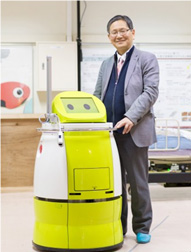
In 2013, Fukushima Medical University and company presented ‘Terapio’, a robot who supports round visits within hospitals. Subsequent to this, they also supported the development of patrolling robots and robots who can converse in different languages. "Professor Michio Okada, the head of the TUT Center for Human-Robot Symbiosis Research, puts forward the idea of a ‘weak robot’, and aims for a more natural coexistence by encouraging humans to help robots with things they struggle with. I want to use this knowledge and combine it with
sensors and AI technology to create a smart hospital to support the entire hospital."
President Terashima, who not only manages the university, but is also a dedicated researcher, will likely serve as a big inspiration for the students.
技術科学で世界を変え、社会に貢献する元気な大学をめざして
2020年4月、世界中が新型コロナウイルス感染症の拡大に戦々恐々とするなか、豊橋技術科学大学の新学長に就任した寺嶋一彦。就任早々、学生の教育と研究の継続を第一に考えながら、さまざまなコロナ対策を講じてきた。寺嶋学長は、「ピンチはチャンス!」と捉えて、コロナとの共生を見据え、大学の新たな役割を説く。センシングやAI、IoT、ロボットなど、本学の得意分野をきわめることによって、地域や世界の社会課題解決に貢献していくという。
教育と研究を止めないために
2020年春、新型コロナウイルス感染症の拡大を懸念して、日本の多くの大学は従来の対面授業から、オンラインもしくはオンデマンドによる教育に切り替えた。豊橋技術科学大学も同様に、入学式を取りやめ、4月から準備を進めて、5月からは遠隔によるオンデマンド授業を開始した。そのなかで寺嶋学長が腐心したのが、教育と研究の質の確保だ。
「とにかくがむしゃらに取り組んできて、少しずつ成果が見えてきました。先生方には急遽、オンデマンド講義用のビデオをご用意いただくなど、ご苦労を強いたとは思いますが、オンデマンド学習は予習・復習には有効であり、知識の習得にはむしろ向いている面もあると感じています。また、本学は2,000人中約300人が留学生で、日本に渡航できない新入生や一時帰国中の多くの留学生も、自国にいながら遠隔で授業を受けることができました。
一方、やはり対面授業の良さを実感したところも大いにあります。教員と学生たちが顔を合わせて議論し、密にコミュニケーションをとるなかでしか生まれないものがある。その際たるものが研究です。いま、遠隔授業が続くなかで、大学不要論が囁かれていますが、研究の場を提供できるのはやはり大学の重要な役割。だからこそ、徹底したコロナ対策が不可欠でした」と寺嶋学長は力説する。
しかし、本学ならではの事情もあって、コロナ対策にあたり相当に悩んだと寺嶋学長は心中を明かす。3分の1の学生が大学構内の寮で生活をしているうえ、実験や研究のために研究室に出入りする学生も少なくない。下手をすればクラスターが発生しかねなかった。とくにグローバル科学技術アーキテクト養成コースの学生を中心とした約180名は、原則として全員がシェアハウス型の学生宿舎に入居しており、日本人と留学生が5人1部屋で生活をともにしている。
「悩みましたが、けっして教育と研究を止めてはならないという思いを強くもち、手洗いや消毒、三密の回避など、新しい生活様式を徹底することで対応してきました。おかげさまでクラスターを生むことなく、現在に至っています」
メッセージの発信や経済支援など、学びの環境整備に注力する
一方で、コロナ禍のなかで不安を抱える学生を少しでも励ましたいと、学長自らのアイデアによるユニークな取り組みも行った。その一つがTUTエールランチだ。「学生寮の入居者を対象に、5月の毎週金曜に栄養バランスの取れた500円相当のランチを無料で提供しました。学生の心身の健康に多少なりとも役立ったのではないかと思っています。
また私自身は、4月から5月にかけて、5週間に渡り、大学のホームページで「学長講話シリーズ〜学生へのエール」と題して、学生へメッセージを届けました。グローバル化とSDGs、日頃から自らの行動指針としている大人のための50箇条(テラゴロク)、専門のロボット工学入門などについて、テキストと動画で配信しています。最終話の『感染症の歴史〜人間万事塞翁が馬』では、感染症の歴史や故事をひもときながら、『ピンチをチャンスに変えろ』と、メッセージを送りました」
この講話のなかで、約300年前に、アイザック・ニュートンがペストの流行によりケンブリッジ大学が閉鎖された際、故郷に戻り、自由に思考する時間を得て、万有引力の法則などの着想を得た逸話を紹介している。「自由な活動が難しいいまこそ、読書や深い思索を通じて、自らを磨いてほしい」と寺嶋学長は語る。
経済支援として、大学独自の支援プランを作成し、全学生2,000人に一律3万円の給付も行った。これは国立大学としては初の試みである。「本学の学生は8割が全国各地にある高専の出身者で、学生の多くが親元を離れて生活しています。遠隔授業に際して、Wi-Fiをはじめネットワーク環境を整える必要があり、その手助けになればと考えました。コロナの影響で生活に困窮している学生もいると聞いているので、そうした学生には授業料免除や奨学金などの制度も紹介しています」
それらの資金の一部を賄うために、「新型コロナ対策募金」を立ち上げ、教職員や卒業生らに呼びかけ、すでに2,000万円を集めた。同窓会の結束の強さも、本学の大きな魅力の一つと言える。
Withコロナ、Afterコロナを見据えた大学の新しい役割
いまだ収束が見えないどころか、第三波に突入してさらなる感染拡大が懸念されるが、寺嶋学長は新たな大学像について模索している。
「大学の役割は教育と研究にありますが、技術科学における教育・研究の使命とは、優秀な学生を輩出し、優れた研究成果を創出して、地域社会に貢献することだと思っています。その源泉は、活力に溢れ、高い志と使命をもった教職員や学生であり、彼らの進取の気性に期待しています。
教えることと、研く(みがく)ことについてはオンラインやオンデマンドでも置き換えられます。つまり、知識は遠隔でも身につけられます。ただし、育てることと、究めることについては、教員と学生の丁々発止の議論が欠かせませんし、とくに工学系では実際に手を動かしてモノをつくり、実験することが不可欠です。ひらめきによってイノベーションを生み出すには、リアルな体験により培った知恵の実践が必要なんですね。したがって、今後は遠隔と対面授業を1対1の割合にして、対面授業については、育てることと究めることに集中していきたいと思っています」
さらに、高専出身者が多いという本学の特色を活かして、今後はセンシングやIoT/AI、ロボットなどのCPS(Cyber Physical Systems)技術を強化し、教育と研究で世界をリードする大学へと導いていきたいと寺嶋学長は展望を語る。
「これらは、日本政府が掲げている"Society5.0" −サイバー空間とフィジカル空間を高度に融合させたシステムにより、経済発展と社会課題の解決を両立する、人間中心の社会− を実現するのに欠かせない研究分野です。そして、この分野を究めるためには、国際連携と産学連携、地域連携が欠かせないと考えています。
国際連携に関しては、本学は多文化共生を重視しています。留学生の積極的な受け入れだけでなく、海外インターンシップやダブルディグリー・プログラム(本学と海外大学の両方で学位が取れる)、バイリンガル授業など、多彩なプログラムを用意しています。コロナ禍により気軽に移動できない状況にはありますが、海外との強固なネットワークがあればこそ、今後もさらに多文化共生を推進できると確信しています。
また、産学連携についても、マッチング方式ファンドによる企業との協働研究を進めるとともに、科学技術振興機構(JST)の『産学共創プラットフォーム共同研究推進プログラム』(OPERA)事業の採択などによる、研究資金を基に、企業とともに社会実装まで含めた研究開発を進めています。これにより、地域を中心に、さまざまな社会課題を解決していきたい。そうすることで、世界をリードする工科系大学をめざしていけたらと考えています」と寺嶋学長は締め括った。
(取材・文=田井中麻都佳)
取材後記
寺嶋学長は、大学経営に取り組む一方、専門のロボット工学の知識や人脈を活かし、本学が推進するロボット研究もサポートしている。
「自動車に代表されるように、技術が誕生してから世の中に浸透するのは50年くらいかかる。ロボット元年が1980年ですから、あと10年もすれば、ロボットは私たちの暮らしに広く浸透するでしょう。そのときに重要な役割を担うのが、介護や医療の現場で活躍するロボットです」と寺嶋学長は語る。
2013年に福島県立医科大学らと共同で、病院内の回診業務を支援するロボット「テラピオ」を発表。その後も見回りや多言語に対話できるロボットなどの開発をサポートしてきた。「本学の人間・ロボット共生リサーチセンター長である岡田美智男教授は、『弱いロボット』を提唱されていて、ロボットが苦手なことは人間に手伝ってもらうように促し、より自然なかたちの共生をめざしています。そうした知見を活かし、さらにセンサやAI技術なども組み合わせて、病院全体をサポートするようなスマートホスピタルを実現したいと考えています」
経営者としての顔だけでなく、研究者として夢を追い求める学長の姿は、学生たちにも大きな刺激となるにちがいない。
Researcher Profile
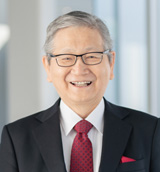
Dr. Kazuhiko Terashima
Dr. Kazuhiko Terashima graduated bachelor course and master course in Mechanical Engineering in Kyoto Institute of Technology, and Phd course in Precision Mechanics of Graduate School in Kyoto University, respectively 1976, 1978 and 1981 respectively. He got Phd degree in Kyoto University at 1982. He became a Professor in Toyohashi University of Technology (TUT) at 1994, and Emeritus Professor at 2018. He is now President in TUT from April, 2020, via vice president during 6 years. His main subjects are control theory and its application to industry processes, and robotics with application to life support and smart hospital.
Reporter Profile
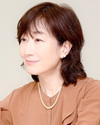
Madoka Tainaka is a freelance editor, writer and interpreter. She graduated in Law from Chuo University, Japan. She served as a chief editor of "Nature Interface" magazine, a committee for the promotion of Information and Science Technology at MEXT (Ministry of Education, Culture, Sports, Science and Technology).
ここでコンテンツ終わりです。

